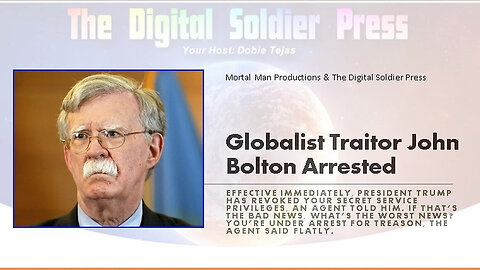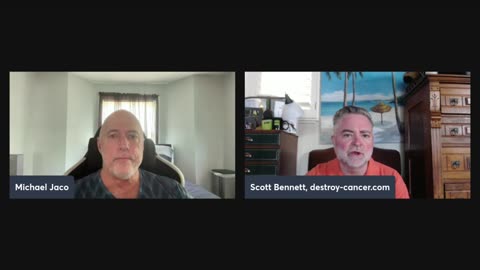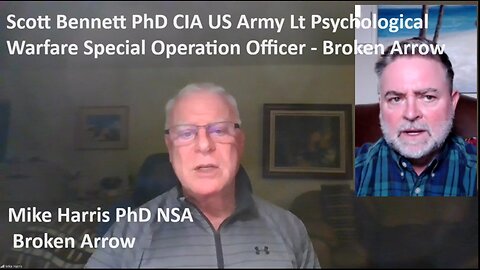
-
Globalist Traitor John Bolton Arrested
 New Q. SGH SG AnonGlobalist Traitor John Bolton Arrested6.62K views 9 comments
New Q. SGH SG AnonGlobalist Traitor John Bolton Arrested6.62K views 9 comments -
Scott Bennett RIP USA Army Special Ops Officer Whistleblower Dies Under Mysterious Circumstances
 VictorHugoArtScott Bennett R.I.P. USA Army Special Ops Officer and Whistleblower Died Under Mysterious Circumstances on 11/21/24 at the age of 55, of pancreatic cancer, though some allege he was poisoned for exposing widespread corruption in Ukraine, after appearing on Russian television. This interview with the Maverick Artist Victor-Hugo is reposted in hopes that Scott Bennett's brave life as a whistleblower and journalist will have served as a call to action for people around the world to rise up against the Satanic Mafia, who identify as being of the Father of All Lies, The Synagogue of Satan and the minions who serve them, all of which are hellbent on depopulating the planet down to 500 million, as noted in the Georgia Guidestones, Protocols of The Elders of Zion and The Talmud. Rest in Peace, Brother. Keep Shining. Flow. If you value these truth tellers and can contribute to keep these reports coming, please do so by clicking on the links below: https://armypsyop.wixsite.com/shellgame/deep-state-psyop https://victorhugocollection.com Victor-Hugo Vaca II claims "art is the last bastion of free speech" and as a dissident, Veteran, American refugee, living in the former USSR, Republic of Georgia, near the border with Russia, between War Zones and hot spots of global conflict, after escaping China, two hours before the last border closed, on the day that the Wuhan virus whistleblower, Dr. Li Wenliang died, he uses modern-art-gonzo-journalism to combat censorship on steroids during the information war. Known as, The Maverick Artist Victor-Hugo, the native New Yorker born in the same Elmhurst Hospital as President Donald Trump,is listed in the Library of Congress Reference Book, by DB Burkeman titled, "Stickers: From Punk Rock to Contemporary Art", as "one of the most influential artists of our time", alongside The Wu Tang Clan, Banksy and Shepard Fairey. The Maverick Artist Victor-Hugo founded and Trademarked, theModern Art Music Movement, the fusion of art, music, film, fashion, literature and education, fostering peace, love and compassionate wealth, worldwide and attended the prestigious United States Naval Academy alongside Carter Page in the Class of 1993. He has dedicated his life to shedding Light on the darkness so that the darkness cannot overcome it and starts every Modern Art Music Movement podcast by stating, "My job is not to be politically correct. It is to witness, observe, analyze and document, the beautiful chaos that surrounds us all, so that future generations can understand how we got to this moment in time." Victor-Hugo Vaca II can be reached at vhviipress@msn.com and links for his podcast channels on Rumble and BitChute can be found athttps://victorhugocollection.com/ To purchase The Victor-Hugo Collection contact The William DeBilzan Gallery William DeBilzan Art Gallery Delray Beach Florida 561-266 2090 wdebilzan@gmail.com3.56K views 25 comments
VictorHugoArtScott Bennett R.I.P. USA Army Special Ops Officer and Whistleblower Died Under Mysterious Circumstances on 11/21/24 at the age of 55, of pancreatic cancer, though some allege he was poisoned for exposing widespread corruption in Ukraine, after appearing on Russian television. This interview with the Maverick Artist Victor-Hugo is reposted in hopes that Scott Bennett's brave life as a whistleblower and journalist will have served as a call to action for people around the world to rise up against the Satanic Mafia, who identify as being of the Father of All Lies, The Synagogue of Satan and the minions who serve them, all of which are hellbent on depopulating the planet down to 500 million, as noted in the Georgia Guidestones, Protocols of The Elders of Zion and The Talmud. Rest in Peace, Brother. Keep Shining. Flow. If you value these truth tellers and can contribute to keep these reports coming, please do so by clicking on the links below: https://armypsyop.wixsite.com/shellgame/deep-state-psyop https://victorhugocollection.com Victor-Hugo Vaca II claims "art is the last bastion of free speech" and as a dissident, Veteran, American refugee, living in the former USSR, Republic of Georgia, near the border with Russia, between War Zones and hot spots of global conflict, after escaping China, two hours before the last border closed, on the day that the Wuhan virus whistleblower, Dr. Li Wenliang died, he uses modern-art-gonzo-journalism to combat censorship on steroids during the information war. Known as, The Maverick Artist Victor-Hugo, the native New Yorker born in the same Elmhurst Hospital as President Donald Trump,is listed in the Library of Congress Reference Book, by DB Burkeman titled, "Stickers: From Punk Rock to Contemporary Art", as "one of the most influential artists of our time", alongside The Wu Tang Clan, Banksy and Shepard Fairey. The Maverick Artist Victor-Hugo founded and Trademarked, theModern Art Music Movement, the fusion of art, music, film, fashion, literature and education, fostering peace, love and compassionate wealth, worldwide and attended the prestigious United States Naval Academy alongside Carter Page in the Class of 1993. He has dedicated his life to shedding Light on the darkness so that the darkness cannot overcome it and starts every Modern Art Music Movement podcast by stating, "My job is not to be politically correct. It is to witness, observe, analyze and document, the beautiful chaos that surrounds us all, so that future generations can understand how we got to this moment in time." Victor-Hugo Vaca II can be reached at vhviipress@msn.com and links for his podcast channels on Rumble and BitChute can be found athttps://victorhugocollection.com/ To purchase The Victor-Hugo Collection contact The William DeBilzan Gallery William DeBilzan Art Gallery Delray Beach Florida 561-266 2090 wdebilzan@gmail.com3.56K views 25 comments -
SEXUAL HABITS OF FREEMASONRY ~[ STARFISH ABUSERS ]~
 VeteransAgainstTreason🚨 ‼️ NEW CLEVELAND CLINIC QUANTUM HEALTHCARE IBM COMPUTER. MANY KINDS OF MEDBEDS EXIST, This one [ ZAP ⚡️ ] seems like 👍 the best so far…. ( guessing - Tom Trefts Veterans Health Researcher ) … saw a picture of Trump checking them out. PDF ~ https://zapsurgical.com/wp-content/uploads/ZAP_Patient_Brochure_DIGITAL.pdf 1.) https://consultqd.clevelandclinic.org/quantum-computing-debuts-at-cleveland-clinic LOCATED IN THE LERNER INSTITUTE MAIN CAMPUS https://www.lerner.ccf.org/ CLEVELAND CLINIC CEO https://my.clevelandclinic.org/staff/5752-tomislav-mihaljevic DARPA Quantum Benchmarking Proposal. https://my.clevelandclinic.org/research/computational-life-sciences/discovery-accelerator/our-projects DARPA Quantum Benchmarking Proposal CCF PI: Daniel Blankenberg This is a federal award from the United States Defense Advanced Research Projects Agency (DARPA) to develop a quantum computing benchmarking framework for quantum computing architectures that can overcome any failures in hardware or software. It will lead to the development and analysis of various computational analysis problems to test and evaluate scenarios relevant to a variety of fields — including genomics, computational biology, protein conformational analysis, protein-drug interaction, radiation therapy planning, healthcare process optimization, computational biology and computational chemistry. • Investigating Quantum Kernels for Real-World Predictions based on EHRs CCF PI: Mina Chung This project will explore the benefits of quantum computing to study the risk factors for cardiovascular complications following non-cardiac surgery. Major adverse cardiac events are a leading cause of non-cardiac morbidity and mortality around the time of surgery. By applying quantum machine learning techniques, we can enhance our understanding of the risk factors, improve patient outcomes and potentially reduce healthcare costs and utilization by facilitating clinical decision-making. The results of this project can also help determine if quantum computing-based machine learning algorithms can improve patient outcomes in other clinical settings. • Leveraging Quantum Computing for T-Cell Receptor Engineering CCF PI: Timothy Chan Cleveland Clinic and IBM are combining artificial intelligence and quantum computing to advance a key biomedical task in cancer immunotherapy design. The project’s goal is to engineer optimal immune T-cells and immune T-cell receptors that are highly efficient at killing cancer cells. The team will achieve this by combining knowledge of classical and quantum computing algorithms with Cleveland Clinic’s novel experimental data sets. Quantum Algorithms for Feature Identification and Feature Selection CCF PI: Xiaojuan Li This project aims to leverage the power of quantum computing algorithms to optimize feature identification and feature selection in healthcare and life sciences (HCLS) data sets. Cleveland Clinic and IBM will identify optimal ways to represent HCLS datasets using fewer features. This will help to represent noisy datasets that are common bottlenecks for performance. By creating a better understanding of this problem in the context of quantum computing, we will help guide future research efforts, as well as hardware and software development. A deeper understanding of this field will also help with the improvement of classical AI algorithms. Quantum Algorithms to Improve Early Lung Cancer DetectionBiomarkers CCF PI: Peter Mazzone Cleveland Clinic and IBM are evaluating the potential for quantum computing to develop early lung cancer detection with blood tests and other easy-to-use biomarkers. Early detection of lung cancer improves patient outcomes. Despite this, the success of lung cancer screening is limited by strict eligibility criteria, slow uptake, poor adherence to annual screening and the impact of false positives (e.g. lung nodules) on patient outcomes. This project will explore an easy-to-use, accurate and inexpensive molecular biomarker (e.g. blood test) to improve lung cancer screening outcomes. Cleveland Clinic and IBM are evaluating the potential for quantum computing to improve the accuracy of early lung cancer detection biomarkers. Quantum-Enabled Machine Learning Optimization of Antibiotic Choice Prior to Culture Result CCF PI: Sandip Vasavada Cleveland Clinic and IBM are combining artificial intelligence with quantum computing to advance a key biomedical task for prediction of antibiotic resistance. Antibiotic resistance is rampant and increasing worldwide, and a main driver of resistance is the inappropriate use and overuse of antibiotics. This project aims to create a model using utility-scale quantum machine learning to predict antibiotic resistance for urinary tract infections. This model can help decrease the amount of antibiotics unnecessarily prescribed. It will also be one of the first utility-scale quantum experiments for healthcare and life science applications using a targeted 50-100 qubits. Quantum Simulations of Biochemical Reactions CCF PI: Charis Eng This project aims to perform quantum simulations to study chemical reactions in important biological processes. Through simulations, we may develop a deeper understanding of biomedical reactions that can lead to human disease. Currently, performing these types of simulations is quite limited by existing computing technology. Cleveland Clinic and IBM plan to address this by developing new quantum simulation algorithms as the first of their kind to be demonstrated on a quantum computer. One of the most significant benefits of this work is that it will allow researchers to stop relying on low-accuracy methods and instead make use of more precise quantum simulations that can potentially lead to new therapies. The IBM Quantum System One is installed in the Lerner Research Institute on Cleveland Clinic’s main campus. Cleveland Clinic and IBM researchers already are devising projects that will bring quantum computing and the Discovery Accelerator’s other components to bear on highly complex challenges in areas such as drug discovery and design, genomic analysis, molecular modeling and medical imaging. “This technology holds tremendous promise in revolutionizing healthcare and expediting progress toward new cares, cures and solutions for patients,” says Tom Mihaljevic, MD, Cleveland Clinic CEO and President and Morton L. Mandel CEO Chair. “Quantum and other advanced computing technologies will help researchers tackle historic scientific bottlenecks and potentially find new treatments for patients with diseases like cancer, Alzheimer’s and diabetes.” Quantum advantages Quantum computing is a radically new and rapidly evolving computing technology that has the potential to dramatically change how data is analyzed and what can be discovered from it. It uses the principles of quantum mechanics — which describe the strange ways that nature works at the subatomic level — to solve problems too complicated or massive for classical computers. Traditional digital computers operate with binary information-storing bits, which function in only one state at a time — off or on, zero or one. Although powerful, bit-based computers struggle with problems that have multiple variables interacting in complex ways, such as trying to predict what 3D shape a chain of protein molecules will form. Quantum computers use units of information called quantum bits, or qubits, which exist in multiple states simultaneously (a condition known as superposition). That capability allows qubits to hold much more information than binary bits and interact in novel ways (called entanglement and interference) to process data. Using qubits, quantum computers can create multidimensional computing environments in which the patterns that link seemingly disparate individual data points emerge. Quantum computers can operate substantially faster and at a larger scale than classical computers, meaning they will be superior for certain data- and time-intensive uses, such as probing complex biological processes and systems. For example, simulating the energy configuration of a single caffeine molecule would require 1048 bits — an impossible processing task even for today’s most powerful supercomputers. A quantum computer could represent the molecular configuration of caffeine with 160 qubits. The Quantum System One in place at the Discovery Accelerator uses IBM’s 127-qubit Eagle processor. Within three years, the Discovery Accelerator will be the first client facility to host IBM’s next-generation quantum computer, the 1,000+ qubit Quantum System Two. The 1,000-qubit threshold is an inflection point at which problems will be solved more efficiently on quantum computers than on the world’s best supercomputers. The need for speed Speed and efficiency are vital at a time when researchers are awash in information that must be analyzed to be understood and acted on. The volume of healthcare data — such as information from clinical trials, disease registries, electronic health records and medical devices — is growing at a compound annual growth rate of 36%. At present, it takes an average of 17 years for a scientific discovery in a biomedical research lab to become a tangible therapy or diagnostic test available to patients. “It still takes forever to go from a question to an answer,” says Lara Jehi, MD, Cleveland Clinic’s Chief Research Information Officer and Discovery Accelerator Executive Program Leader. “It’s frustrating because at the same time in this digital age, we have all the data. We should be able to come up with better answers more quickly, but we can’t because the data is too much for classical computing tools to handle.” Although other institutions may be able to access quantum computing via the cloud, they could encounter long wait times and limits on usage. “It’s hard to lead in that situation,” Dr. Jehi says. “Fortunately, thanks to our partnership with IBM, Cleveland Clinic has its own quantum computer, in the middle of one of the top healthcare systems in the world.” More computing capabilities In addition to quantum computing, the Discovery Accelerator’s suite of advanced computing technologies includes artificial intelligence (AI) and high-performance computing (HPC) through the hybrid cloud. AI involves advanced computer algorithms and systems that learn from data, organize knowledge and make inferences and deductions. AI is important in areas such as natural language processing, image analysis and speech recognition, which are useful in biomedical research and clinical care. Recent advances in deep learning and foundation models have potential to leverage complex data across the biomedical spectrum, from molecular and protein data to omics and electronic health records. AI surrogate models are accelerating and lowering the cost of computing simulations in tasks such as protein structure prediction. AI generative models are valuable for scaling hypotheses generation, which is a key in drug and biomarker design and discovery. HPC uses clusters of powerful processors, working in massively parallel fashion, to analyze huge datasets and solve complex problems at extremely high speeds — typically more than a million times faster than desktop or laptop computers and servers. HPC runs on clusters of high-speed computer servers networked together. In healthcare research, the power of HPC can be used for complicated processes and projects such as DNA sequencing, drug discovery and design, rapid cancer diagnosis, molecular modeling, and running artificial intelligence algorithms and simulations. Research focus and projects To maximize the impact of its advanced computing resources, the Discovery Accelerator will focus on eight cross-cutting areas of research that bridge multiple biomedical domains, systems, organs and diseases. This integrative approach means that discoveries in one focus area will have a synergistic effect, accelerating progress across the enterprise. The priority areas are: • Drug discovery • Clinical translation • Bedside translation • Population health • Healthy behaviors • Omics • Physiology • Imaging Cleveland Clinic and IBM already have begun a robust portfolio of research projects likely to produce high-impact results. Projects include: • Developing a quantum computing method to explore protein-drug interactions, improving the process of screening and optimizing drugs targeted to specific proteins. • Developing AI-based predictive systems and other analytic tools to search databases of human gene sequences and the molecular targets of existing drugs, looking for matches that could indicate therapeutic potential in Alzheimer’s disease and dementia. • Creating an analytic environment in the hybrid cloud to support single-omics research, a field that involves simultaneously profiling the state and interactions of DNA, RNA, proteins and other components of a single cell to gain insights into cellular mechanisms and how specific types of cells and their genetic material affect, and are affected by, disease. The Discovery Accelerator could hold the key to making drug discovery more expeditious and cost-effective, says Shaun Stauffer, PhD, Director of Cleveland Clinic’s Center for Therapeutics Discovery. “It’s going to change the vector,” says Dr. Stauffer, whose team is working closely with IBM to leverage AI and molecular dynamics modeling to streamline the drug discovery process. “A big part of drug discovery is risk mitigation and risk removal,” he says. “With computational science, we have an opportunity to make smarter decisions upfront and reduce the number of compounds we have to synthesize to identify a clinical candidate. These new tools will have embedded knowledge about what to avoid. We’ll receive a clear option that should allow us to get from point A to point B with a much higher level of confidence.” Collaboration opportunities Access to quantum computing and the Discovery Accelerator’s other advanced computing resources and expertise isn’t limited to Cleveland Clinic and IBM researchers. The facility is seeking collaborators from diverse fields — pharmaceutical companies, academic medical centers, hospital systems, diagnostic testing laboratories, healthcare software and electronic health record system developers, research institutions, colleges and universities, government organizations, biotechnology firms, medical device companies and others. Collaborators can import their own research project, team up with an existing Discovery Accelerator research project, or utilize the Discovery Accelerator’s computing assets via IBM’s hybrid cloud. To further encourage collaboration and advancement in quantum computing, Cleveland Clinic is a founding partner of the Life Sciences and Healthcare Quantum Innovation Hub, an initiative led by the Washington, D.C.-based nonprofit development organization Connected DMV. Cleveland Clinic has been tapped to help define quantum computing’s role in the future of healthcare and to educate other health systems about the technology’s possibilities. Educating a high-tech workforce A pillar of the Discovery Accelerator’s mission is education — providing training to develop the healthcare research and technology workforce of the future and creating jobs to grow the economy. The Cleveland Clinic-IBM partnership plans to provide innovative curricula in data science and quantum computing, offering training and certification programs designed for participants ranging from high school to the professional level, with access through grants, scholarships, fellowships and endowments. There will be research symposia and workshops intended for academia, industry, government and the public. “We need to prepare a workforce that is able to make sense of the new technology,” says Neil Mehta, MD, a Cleveland Clinic internal medicine physician who oversees curriculum and technology as Associate Dean at Cleveland Clinic Lerner College of Medicine and who is helping lead the Discovery Accelerator education efforts along with Christine Moravec, PhD, and IBM colleagues. “We’re already training people how to be good clinicians and good scientists,” says Dr. Moravec, Director of the Lerner Research Institute’s Research Education and Training Center. “They already speak the language of medicine and science. Now we need to train them how to speak the language of data and computation, too.” Photo credit: Ryan Lavine for IBM ◦663 views 6 comments
VeteransAgainstTreason🚨 ‼️ NEW CLEVELAND CLINIC QUANTUM HEALTHCARE IBM COMPUTER. MANY KINDS OF MEDBEDS EXIST, This one [ ZAP ⚡️ ] seems like 👍 the best so far…. ( guessing - Tom Trefts Veterans Health Researcher ) … saw a picture of Trump checking them out. PDF ~ https://zapsurgical.com/wp-content/uploads/ZAP_Patient_Brochure_DIGITAL.pdf 1.) https://consultqd.clevelandclinic.org/quantum-computing-debuts-at-cleveland-clinic LOCATED IN THE LERNER INSTITUTE MAIN CAMPUS https://www.lerner.ccf.org/ CLEVELAND CLINIC CEO https://my.clevelandclinic.org/staff/5752-tomislav-mihaljevic DARPA Quantum Benchmarking Proposal. https://my.clevelandclinic.org/research/computational-life-sciences/discovery-accelerator/our-projects DARPA Quantum Benchmarking Proposal CCF PI: Daniel Blankenberg This is a federal award from the United States Defense Advanced Research Projects Agency (DARPA) to develop a quantum computing benchmarking framework for quantum computing architectures that can overcome any failures in hardware or software. It will lead to the development and analysis of various computational analysis problems to test and evaluate scenarios relevant to a variety of fields — including genomics, computational biology, protein conformational analysis, protein-drug interaction, radiation therapy planning, healthcare process optimization, computational biology and computational chemistry. • Investigating Quantum Kernels for Real-World Predictions based on EHRs CCF PI: Mina Chung This project will explore the benefits of quantum computing to study the risk factors for cardiovascular complications following non-cardiac surgery. Major adverse cardiac events are a leading cause of non-cardiac morbidity and mortality around the time of surgery. By applying quantum machine learning techniques, we can enhance our understanding of the risk factors, improve patient outcomes and potentially reduce healthcare costs and utilization by facilitating clinical decision-making. The results of this project can also help determine if quantum computing-based machine learning algorithms can improve patient outcomes in other clinical settings. • Leveraging Quantum Computing for T-Cell Receptor Engineering CCF PI: Timothy Chan Cleveland Clinic and IBM are combining artificial intelligence and quantum computing to advance a key biomedical task in cancer immunotherapy design. The project’s goal is to engineer optimal immune T-cells and immune T-cell receptors that are highly efficient at killing cancer cells. The team will achieve this by combining knowledge of classical and quantum computing algorithms with Cleveland Clinic’s novel experimental data sets. Quantum Algorithms for Feature Identification and Feature Selection CCF PI: Xiaojuan Li This project aims to leverage the power of quantum computing algorithms to optimize feature identification and feature selection in healthcare and life sciences (HCLS) data sets. Cleveland Clinic and IBM will identify optimal ways to represent HCLS datasets using fewer features. This will help to represent noisy datasets that are common bottlenecks for performance. By creating a better understanding of this problem in the context of quantum computing, we will help guide future research efforts, as well as hardware and software development. A deeper understanding of this field will also help with the improvement of classical AI algorithms. Quantum Algorithms to Improve Early Lung Cancer DetectionBiomarkers CCF PI: Peter Mazzone Cleveland Clinic and IBM are evaluating the potential for quantum computing to develop early lung cancer detection with blood tests and other easy-to-use biomarkers. Early detection of lung cancer improves patient outcomes. Despite this, the success of lung cancer screening is limited by strict eligibility criteria, slow uptake, poor adherence to annual screening and the impact of false positives (e.g. lung nodules) on patient outcomes. This project will explore an easy-to-use, accurate and inexpensive molecular biomarker (e.g. blood test) to improve lung cancer screening outcomes. Cleveland Clinic and IBM are evaluating the potential for quantum computing to improve the accuracy of early lung cancer detection biomarkers. Quantum-Enabled Machine Learning Optimization of Antibiotic Choice Prior to Culture Result CCF PI: Sandip Vasavada Cleveland Clinic and IBM are combining artificial intelligence with quantum computing to advance a key biomedical task for prediction of antibiotic resistance. Antibiotic resistance is rampant and increasing worldwide, and a main driver of resistance is the inappropriate use and overuse of antibiotics. This project aims to create a model using utility-scale quantum machine learning to predict antibiotic resistance for urinary tract infections. This model can help decrease the amount of antibiotics unnecessarily prescribed. It will also be one of the first utility-scale quantum experiments for healthcare and life science applications using a targeted 50-100 qubits. Quantum Simulations of Biochemical Reactions CCF PI: Charis Eng This project aims to perform quantum simulations to study chemical reactions in important biological processes. Through simulations, we may develop a deeper understanding of biomedical reactions that can lead to human disease. Currently, performing these types of simulations is quite limited by existing computing technology. Cleveland Clinic and IBM plan to address this by developing new quantum simulation algorithms as the first of their kind to be demonstrated on a quantum computer. One of the most significant benefits of this work is that it will allow researchers to stop relying on low-accuracy methods and instead make use of more precise quantum simulations that can potentially lead to new therapies. The IBM Quantum System One is installed in the Lerner Research Institute on Cleveland Clinic’s main campus. Cleveland Clinic and IBM researchers already are devising projects that will bring quantum computing and the Discovery Accelerator’s other components to bear on highly complex challenges in areas such as drug discovery and design, genomic analysis, molecular modeling and medical imaging. “This technology holds tremendous promise in revolutionizing healthcare and expediting progress toward new cares, cures and solutions for patients,” says Tom Mihaljevic, MD, Cleveland Clinic CEO and President and Morton L. Mandel CEO Chair. “Quantum and other advanced computing technologies will help researchers tackle historic scientific bottlenecks and potentially find new treatments for patients with diseases like cancer, Alzheimer’s and diabetes.” Quantum advantages Quantum computing is a radically new and rapidly evolving computing technology that has the potential to dramatically change how data is analyzed and what can be discovered from it. It uses the principles of quantum mechanics — which describe the strange ways that nature works at the subatomic level — to solve problems too complicated or massive for classical computers. Traditional digital computers operate with binary information-storing bits, which function in only one state at a time — off or on, zero or one. Although powerful, bit-based computers struggle with problems that have multiple variables interacting in complex ways, such as trying to predict what 3D shape a chain of protein molecules will form. Quantum computers use units of information called quantum bits, or qubits, which exist in multiple states simultaneously (a condition known as superposition). That capability allows qubits to hold much more information than binary bits and interact in novel ways (called entanglement and interference) to process data. Using qubits, quantum computers can create multidimensional computing environments in which the patterns that link seemingly disparate individual data points emerge. Quantum computers can operate substantially faster and at a larger scale than classical computers, meaning they will be superior for certain data- and time-intensive uses, such as probing complex biological processes and systems. For example, simulating the energy configuration of a single caffeine molecule would require 1048 bits — an impossible processing task even for today’s most powerful supercomputers. A quantum computer could represent the molecular configuration of caffeine with 160 qubits. The Quantum System One in place at the Discovery Accelerator uses IBM’s 127-qubit Eagle processor. Within three years, the Discovery Accelerator will be the first client facility to host IBM’s next-generation quantum computer, the 1,000+ qubit Quantum System Two. The 1,000-qubit threshold is an inflection point at which problems will be solved more efficiently on quantum computers than on the world’s best supercomputers. The need for speed Speed and efficiency are vital at a time when researchers are awash in information that must be analyzed to be understood and acted on. The volume of healthcare data — such as information from clinical trials, disease registries, electronic health records and medical devices — is growing at a compound annual growth rate of 36%. At present, it takes an average of 17 years for a scientific discovery in a biomedical research lab to become a tangible therapy or diagnostic test available to patients. “It still takes forever to go from a question to an answer,” says Lara Jehi, MD, Cleveland Clinic’s Chief Research Information Officer and Discovery Accelerator Executive Program Leader. “It’s frustrating because at the same time in this digital age, we have all the data. We should be able to come up with better answers more quickly, but we can’t because the data is too much for classical computing tools to handle.” Although other institutions may be able to access quantum computing via the cloud, they could encounter long wait times and limits on usage. “It’s hard to lead in that situation,” Dr. Jehi says. “Fortunately, thanks to our partnership with IBM, Cleveland Clinic has its own quantum computer, in the middle of one of the top healthcare systems in the world.” More computing capabilities In addition to quantum computing, the Discovery Accelerator’s suite of advanced computing technologies includes artificial intelligence (AI) and high-performance computing (HPC) through the hybrid cloud. AI involves advanced computer algorithms and systems that learn from data, organize knowledge and make inferences and deductions. AI is important in areas such as natural language processing, image analysis and speech recognition, which are useful in biomedical research and clinical care. Recent advances in deep learning and foundation models have potential to leverage complex data across the biomedical spectrum, from molecular and protein data to omics and electronic health records. AI surrogate models are accelerating and lowering the cost of computing simulations in tasks such as protein structure prediction. AI generative models are valuable for scaling hypotheses generation, which is a key in drug and biomarker design and discovery. HPC uses clusters of powerful processors, working in massively parallel fashion, to analyze huge datasets and solve complex problems at extremely high speeds — typically more than a million times faster than desktop or laptop computers and servers. HPC runs on clusters of high-speed computer servers networked together. In healthcare research, the power of HPC can be used for complicated processes and projects such as DNA sequencing, drug discovery and design, rapid cancer diagnosis, molecular modeling, and running artificial intelligence algorithms and simulations. Research focus and projects To maximize the impact of its advanced computing resources, the Discovery Accelerator will focus on eight cross-cutting areas of research that bridge multiple biomedical domains, systems, organs and diseases. This integrative approach means that discoveries in one focus area will have a synergistic effect, accelerating progress across the enterprise. The priority areas are: • Drug discovery • Clinical translation • Bedside translation • Population health • Healthy behaviors • Omics • Physiology • Imaging Cleveland Clinic and IBM already have begun a robust portfolio of research projects likely to produce high-impact results. Projects include: • Developing a quantum computing method to explore protein-drug interactions, improving the process of screening and optimizing drugs targeted to specific proteins. • Developing AI-based predictive systems and other analytic tools to search databases of human gene sequences and the molecular targets of existing drugs, looking for matches that could indicate therapeutic potential in Alzheimer’s disease and dementia. • Creating an analytic environment in the hybrid cloud to support single-omics research, a field that involves simultaneously profiling the state and interactions of DNA, RNA, proteins and other components of a single cell to gain insights into cellular mechanisms and how specific types of cells and their genetic material affect, and are affected by, disease. The Discovery Accelerator could hold the key to making drug discovery more expeditious and cost-effective, says Shaun Stauffer, PhD, Director of Cleveland Clinic’s Center for Therapeutics Discovery. “It’s going to change the vector,” says Dr. Stauffer, whose team is working closely with IBM to leverage AI and molecular dynamics modeling to streamline the drug discovery process. “A big part of drug discovery is risk mitigation and risk removal,” he says. “With computational science, we have an opportunity to make smarter decisions upfront and reduce the number of compounds we have to synthesize to identify a clinical candidate. These new tools will have embedded knowledge about what to avoid. We’ll receive a clear option that should allow us to get from point A to point B with a much higher level of confidence.” Collaboration opportunities Access to quantum computing and the Discovery Accelerator’s other advanced computing resources and expertise isn’t limited to Cleveland Clinic and IBM researchers. The facility is seeking collaborators from diverse fields — pharmaceutical companies, academic medical centers, hospital systems, diagnostic testing laboratories, healthcare software and electronic health record system developers, research institutions, colleges and universities, government organizations, biotechnology firms, medical device companies and others. Collaborators can import their own research project, team up with an existing Discovery Accelerator research project, or utilize the Discovery Accelerator’s computing assets via IBM’s hybrid cloud. To further encourage collaboration and advancement in quantum computing, Cleveland Clinic is a founding partner of the Life Sciences and Healthcare Quantum Innovation Hub, an initiative led by the Washington, D.C.-based nonprofit development organization Connected DMV. Cleveland Clinic has been tapped to help define quantum computing’s role in the future of healthcare and to educate other health systems about the technology’s possibilities. Educating a high-tech workforce A pillar of the Discovery Accelerator’s mission is education — providing training to develop the healthcare research and technology workforce of the future and creating jobs to grow the economy. The Cleveland Clinic-IBM partnership plans to provide innovative curricula in data science and quantum computing, offering training and certification programs designed for participants ranging from high school to the professional level, with access through grants, scholarships, fellowships and endowments. There will be research symposia and workshops intended for academia, industry, government and the public. “We need to prepare a workforce that is able to make sense of the new technology,” says Neil Mehta, MD, a Cleveland Clinic internal medicine physician who oversees curriculum and technology as Associate Dean at Cleveland Clinic Lerner College of Medicine and who is helping lead the Discovery Accelerator education efforts along with Christine Moravec, PhD, and IBM colleagues. “We’re already training people how to be good clinicians and good scientists,” says Dr. Moravec, Director of the Lerner Research Institute’s Research Education and Training Center. “They already speak the language of medicine and science. Now we need to train them how to speak the language of data and computation, too.” Photo credit: Ryan Lavine for IBM ◦663 views 6 comments -
Coming Iran Israel war insights from Army Psychological Operations Officer expert: Scott Bennett
 Ron Partain | Ghost | Mike King | David Nino RodriguezComing Iran Israel war insights from Army Psychological Operations Officer expert: Scott Bennett _ Michael Jaco199 views 4 comments
Ron Partain | Ghost | Mike King | David Nino RodriguezComing Iran Israel war insights from Army Psychological Operations Officer expert: Scott Bennett _ Michael Jaco199 views 4 comments -
Michael Jaco HUGE Intel: Scott Bennett Army Psyops Officer On Escalating War Between Israel And Iran
 Breaking News Update📢📢: Join us in Telegram: https://t.me/breakingnewsU Michael Jaco HUGE Intel: Scott Bennett Army Psyops Officer On Escalating War Between Israel And Iran.155 views
Breaking News Update📢📢: Join us in Telegram: https://t.me/breakingnewsU Michael Jaco HUGE Intel: Scott Bennett Army Psyops Officer On Escalating War Between Israel And Iran.155 views -
Bennett CIA w/Harris NSA: Moscow Terror Info You are Not Supposed to Know.
 teddolbiJudge w/Top Intel Analysts: US and UK were 100% behind Moscow Crocus Terror, perhaps Israel. https://rumble.com/v4lsspr-judge-wtop-intel-analysts-us-and-uk-were-100-behind-moscow-crocus-terror-pe.html . FSB: UK USA Behind Moscow Terror, Ukraine Directly Involved. Bridges collapsing in USA. https://rumble.com/v4loske-fsb-uk-usa-behind-moscow-terror-ukraine-directly-involved.-bridges-collapsi.html . Update: Zelensky Admitted that He and NATO Intelligence Carried out Mass Murder in Moscow https://rumble.com/v4l79px-update-zelensky-admitted-that-he-and-nato-intelligence-carried-out-mass-mur.html . . President Putin: Everyone, Including Westerners, Behind Moscow Terror To Be Liquidated. https://rumble.com/v4l1bno-putin-everyone-including-westerners-behind-moscow-terror-to-be-liquidated.-.html . President in Waiting Medvedev on the future of Moscow Terror Attack perpetrators: "Everyone is asking me. What to do? They caught them. Good job to everyone who caught them. Should they be killed? Yes, they should. And it will be done. But it's much more important to kill everyone involved. Everyone. Those who paid, those who sympathized, those who helped. Kill them all." https://www.rt.com/russia/594873-moscow-concert-attack-medvedev/ . Moscow terror attack suspects were on drugs https://www.rt.com/russia/595065-terrorist-attack-drugs-fear/ . THINK ABOUT IT What are the odds you could go on the web and find four men willing to go on a Suicide mission to kill over a hundred people at the Crocus City Hall five miles from the center of Moscow, and only get paid $2,500 each? Do you find them on the web under Killers-R-Us? Or is it more likely these are CIA groomed Manchurian Candidates on Scopolamine. All four shooters should be checked for drugs in their system. Scopolamine is the CIA drug of choice. Scopolamine is the drug used to create murderers for false flag operations. Scopolamine is easily obtainable in South America; street criminals use it. It has the amazing property of making people under its influence do anything they are told, leaving them with no memory of what they did. This is how patsies are made. . FROM ISRAEL WITH LOVE Amir Weitmann, the head of the libertarian caucus in Israel's ruling Likud party: Russia is supporting the enemies of Israel. Russia is supporting Nazi people who want to commit genocide on us and Russia will pay the price," Weitmann said. "We're gonna win this war. Afterwards, we're not forgetting what you're doing, we're not forgetting, we will come, we will make sure Ukraine wins. We will make sure that you pay the price for what you have done, you as Russia. https://rumble.com/v3rwc4v-amir-weitmann-israeli-likud-russia-will-pay-the-price.-so-jews-are-in-war-w.html . Today to find the truth is not that difficult. First Watch MSNBC, CNN, NPR. The opposite to whatever they say is the truth. They lie in 9 out of 10 communications. After all, MSM is fairly good source of information. . Words of Wisdom: .. Google does not want you to find what you are searching for but rather – what .. they ..want you to find! Google manipulates you by hiding certain information and imposing other info. .. HOW TO FIGHT GLOBALIST WOKE PIGS? FIND WHAT WOKE PIGS DO NOT LIKE THEN DO MORE OF IT AND HARDER. .. You Can Ignore Reality but You Can't Ignore the Consequences of Ignoring Reality. .. Stupid Happens but Staying Stupid is Optional . . Mike Harris PhD NSA: https://www.theinteldrop.org/ .. Scott Bennett PhD CIA: https://armypsyop.wixsite.com/shellgame http://www.globalfreedomtv.com/ Global Freedom TV Videos https://rumble.com/c/c-2284000 . . SOURCE 2024-03-25 Dr. Scott Bennett with Mr. Mike Harris cut for vol at 11.41 https://rumble.com/v4lj56c-2024-03-25-dr.-scott-bennett-with-mr.-mike-harris.html . RANDOM THOUGHTS . No, We Are Not the Same. https://twitter.com/Emilio2763/status/1772957290317963721 . Definitely, we are not the same. https://twitter.com/Emilio2763/status/17733631029662396891.23K views 5 comments
teddolbiJudge w/Top Intel Analysts: US and UK were 100% behind Moscow Crocus Terror, perhaps Israel. https://rumble.com/v4lsspr-judge-wtop-intel-analysts-us-and-uk-were-100-behind-moscow-crocus-terror-pe.html . FSB: UK USA Behind Moscow Terror, Ukraine Directly Involved. Bridges collapsing in USA. https://rumble.com/v4loske-fsb-uk-usa-behind-moscow-terror-ukraine-directly-involved.-bridges-collapsi.html . Update: Zelensky Admitted that He and NATO Intelligence Carried out Mass Murder in Moscow https://rumble.com/v4l79px-update-zelensky-admitted-that-he-and-nato-intelligence-carried-out-mass-mur.html . . President Putin: Everyone, Including Westerners, Behind Moscow Terror To Be Liquidated. https://rumble.com/v4l1bno-putin-everyone-including-westerners-behind-moscow-terror-to-be-liquidated.-.html . President in Waiting Medvedev on the future of Moscow Terror Attack perpetrators: "Everyone is asking me. What to do? They caught them. Good job to everyone who caught them. Should they be killed? Yes, they should. And it will be done. But it's much more important to kill everyone involved. Everyone. Those who paid, those who sympathized, those who helped. Kill them all." https://www.rt.com/russia/594873-moscow-concert-attack-medvedev/ . Moscow terror attack suspects were on drugs https://www.rt.com/russia/595065-terrorist-attack-drugs-fear/ . THINK ABOUT IT What are the odds you could go on the web and find four men willing to go on a Suicide mission to kill over a hundred people at the Crocus City Hall five miles from the center of Moscow, and only get paid $2,500 each? Do you find them on the web under Killers-R-Us? Or is it more likely these are CIA groomed Manchurian Candidates on Scopolamine. All four shooters should be checked for drugs in their system. Scopolamine is the CIA drug of choice. Scopolamine is the drug used to create murderers for false flag operations. Scopolamine is easily obtainable in South America; street criminals use it. It has the amazing property of making people under its influence do anything they are told, leaving them with no memory of what they did. This is how patsies are made. . FROM ISRAEL WITH LOVE Amir Weitmann, the head of the libertarian caucus in Israel's ruling Likud party: Russia is supporting the enemies of Israel. Russia is supporting Nazi people who want to commit genocide on us and Russia will pay the price," Weitmann said. "We're gonna win this war. Afterwards, we're not forgetting what you're doing, we're not forgetting, we will come, we will make sure Ukraine wins. We will make sure that you pay the price for what you have done, you as Russia. https://rumble.com/v3rwc4v-amir-weitmann-israeli-likud-russia-will-pay-the-price.-so-jews-are-in-war-w.html . Today to find the truth is not that difficult. First Watch MSNBC, CNN, NPR. The opposite to whatever they say is the truth. They lie in 9 out of 10 communications. After all, MSM is fairly good source of information. . Words of Wisdom: .. Google does not want you to find what you are searching for but rather – what .. they ..want you to find! Google manipulates you by hiding certain information and imposing other info. .. HOW TO FIGHT GLOBALIST WOKE PIGS? FIND WHAT WOKE PIGS DO NOT LIKE THEN DO MORE OF IT AND HARDER. .. You Can Ignore Reality but You Can't Ignore the Consequences of Ignoring Reality. .. Stupid Happens but Staying Stupid is Optional . . Mike Harris PhD NSA: https://www.theinteldrop.org/ .. Scott Bennett PhD CIA: https://armypsyop.wixsite.com/shellgame http://www.globalfreedomtv.com/ Global Freedom TV Videos https://rumble.com/c/c-2284000 . . SOURCE 2024-03-25 Dr. Scott Bennett with Mr. Mike Harris cut for vol at 11.41 https://rumble.com/v4lj56c-2024-03-25-dr.-scott-bennett-with-mr.-mike-harris.html . RANDOM THOUGHTS . No, We Are Not the Same. https://twitter.com/Emilio2763/status/1772957290317963721 . Definitely, we are not the same. https://twitter.com/Emilio2763/status/17733631029662396891.23K views 5 comments

![SEXUAL HABITS OF FREEMASONRY ~[ STARFISH ABUSERS ]~](https://1a-1791.com/video/s8/1/b/V/p/Y/bVpYv.oq1b-small-SEXUAL-HABITS-OF-FREEMASONR.jpg)


